
Psychedelic Popular Music
MUSICAL MEANING AND INTERPRETATION
Robert S. Hatten, editor
A Theory of Musical Narrative | BYRON ALMN |
Approaches to Meaning in Music | BYRON ALMN AND EDWARD PEARSALL |
Voicing Gender: Castrati, Travesti, and the Second Woman in Early Nineteenth-Century Italian Opera | NAOMI ANDR |
The Italian Traditions and Puccini: Compositional Theory and Practice in Nineteenth-Century Opera | NICHOLAS BARAGWANATH |
Debussy Redux: The Impact of His Music on Popular Culture | MATTHEW BROWN |
Music and Embodied Cognition: Listening, Moving, Feeling, and Thinking | ARNIE COX |
Music and the Politics of Negation | JAMES R. CURRIE |
Il Trittico, Turandot, and Puccinis Late Style | ANDREW DAVIS |
Neil Young and the Poetics of Energy | WILLIAM ECHARD |
Reconfiguring Myth and Narrative in Contemporary Opera: Osvaldo Golijov, Kaija Saariaho, John Adams, and Tan Dun | YAYOI UNO EVERETT |
Interpreting Musical Gestures, Topics, and Tropes: Mozart, Beethoven, Schubert | ROBERT S. HATTEN |
Musical Meaning in Beethoven: Markedness, Correlation, and Interpretation | ROBERT S. HATTEN |
Intertextuality in Western Art Music | MICHAEL L. KLEIN |
Music and the Crises of the Modern Subject | MICHAEL L. KLEIN |
Music and Narrative since 1900 | MICHAEL L. KLEIN AND NICHOLAS REYLAND |
Musical Forces: Motion, Metaphor, and Meaning in Music | STEVE LARSON |
Is Language a Music? Writings on Musical Form and Signification | DAVID LIDOV |
Pleasure and Meaning in the Classical Symphony | MELANIE LOWE |
Breaking Times Arrow: Experiment and Expression in the Music of Charles Ives | MATTHEW MCDONALD |
Decorum of the Minuet, Delirium of the Waltz: A Study of Dance-Music Relations in  Time Time | ERIC MCKEE |
The Musical Topic: Hunt, Military, Pastoral | RAYMOND MONELLE |
Musical Representations, Subjects, and Objects: The Construction of Musical Thought in Zarlino, Descartes, Rameau, and Weber | JAIRO MORENO |
The Rite of Spring at 100 | SEVERINE NEFF, MAUREEN CARR, AND GRETCHEN HORLACHER, WITH JOHN REEF |
Meaning and Interpretation of Music in Cinema | DAVID NEUMEYER |
Deepening Musical Performance through Movement: The Theory and Practice of Embodied Interpretation | ALEXANDRA PIERCE |
Expressive Intersections in Brahms: Essays in Analysis and Meaning | HEATHER PLATT AND PETER H. SMITH |
Expressive Forms in Brahmss Instrumental Music: Structure and Meaning in His Werther Quartet | PETER H. SMITH |
Music as Philosophy: Adorno and Beethovens Late Style | MICHAEL SPITZER |
Death in Winterreise: Musico-Poetic Associations in Schuberts Song Cycle | LAURI SUURP |
Music and Wonder at the Medici Court: The 1589 Interludes for La pellegrina | NINA TREADWELL |
Reflections on Musical Meaning and Its Representations | LEO TREITLER |
Debussys Late Style: The Compositions of the Great War | MARIANNE WHEELDON |
WILLIAM ECHARD
Psychedelic Popular Music
A History through Musical Topic Theory
INDIANA UNIVERSITY PRESS
This book is a publication of
Indiana University Press
Office of Scholarly Publishing
Herman B Wells Library 350
1320 East 10th Street
Bloomington, Indiana 47405 USA
iupress.indiana.edu
2017 by William Echard
All rights reserved
No part of this book may be reproduced or utilized in any form or by any means, electronic or mechanical, including photocopying and recording, or by any information storage and retrieval system, without permission in writing from the publisher. The Association of American University Presses Resolution on Permissions constitutes the only exception to this prohibition.
The paper used in this publication meets the minimum requirements of the American National Standard for Information SciencesPermanence of Paper for Printed Library Materials, ANSI Z39.481992.
Manufactured in the United States of America
Library of Congress Cataloging-in-Publication Data
Names: Echard, William, author.
Title: Psychedelic popular music : a history through musical topic theory / William Echard.
Other titles: Musical meaning and interpretation.
Description: Bloomington : Indiana University Press, 2017. | Series: Musical meaning and interpretation
Identifiers: LCCN 2016059651 (print) | LCCN 2017000758 (ebook) | ISBN 9780253026453 (pbk. : alk. paper) | ISBN 9780253025661 (hardcover : alk. paper) | ISBN 9780253026590 (ebook)
Subjects: LCSH: Psychedelic rock musicHistory and criticism.
Classification: LCC ML3534 .E25 2017 (print) | LCC ML3534 (ebook) | DDC 781.64dc23
LC record available at https://lccn.loc.gov/2016059651
1 2 3 4 522 21 20 19 18 17
Contents
Acknowledgments
Much of the early work on this book was supported by a research grant from the Social Sciences and Humanities Research Council of Canada. I am also grateful for financial support received from the Faculty of Arts and Social Sciences, Carleton University. As always, special thanks are due to my family, especially to Lillian, Morgan, Sin, and my parents. Your unwavering patience with the long stretches of work and your interest in the results have been absolutely essential to seeing this project through.
Psychedelic Popular Music
Introduction
An hour later, with ten more miles and the visit to the Worlds Biggest Drug Store safely behind us, we were back at home, and I had returned to that reassuring but profoundly unsatisfactory state known as being in ones right mind.
Aldous Huxley, The Doors of Perception, 1954
There are a lot of things this book does not get into. For any writer on music, that is a familiar situation, because it is notoriously difficult to fit even a small part of the listening experience into words. A few seconds of listening will uncover countless nuances that were not even hinted at, no matter how thorough the author aims to be. This rift is heightened when music is tied to personal experiences and states of mind and feeling that are ineffable, profoundly atypical, and ultimately inexpressible. This book does not try to analyze the aesthetic and emotional landscape of psychedelic music, let alone psychedelic experience. It is about something else: how psychedelia developed as an interlinked family of styles, a set of conventional codes and typical features. It is in turn about how psychedelia drew upon preexisting styles and codes, capitalizing on their existing meanings and forging new ones. Aldous Huxley talks about the world of daily life, how it frames and reabsorbs the transient psychedelic experience. He presents this mainly as a loss or a missed opportunity. However, in that framing world and in those framing discourses, a whole language of styles and signs grows up, which can be a fascinating area of study on its own.
Next page
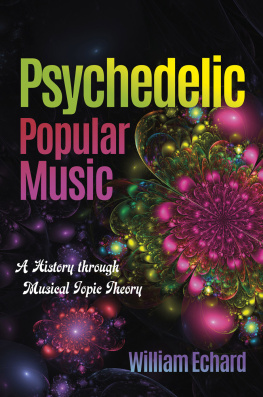


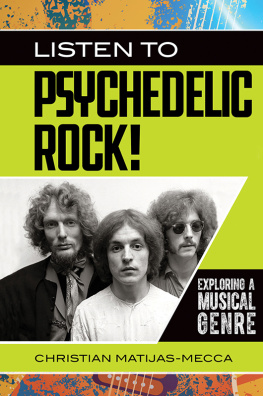
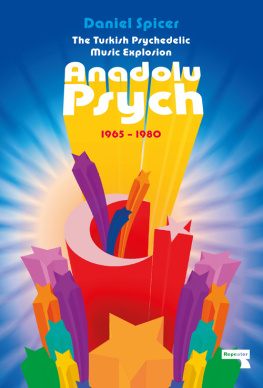
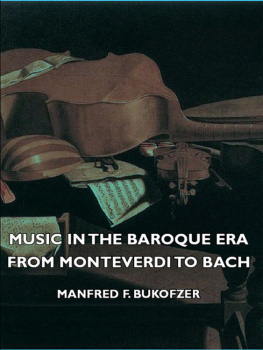
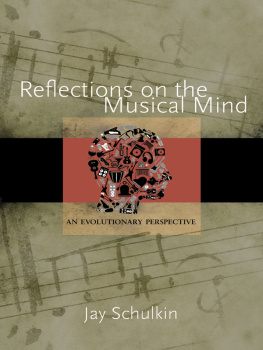

 Time
Time